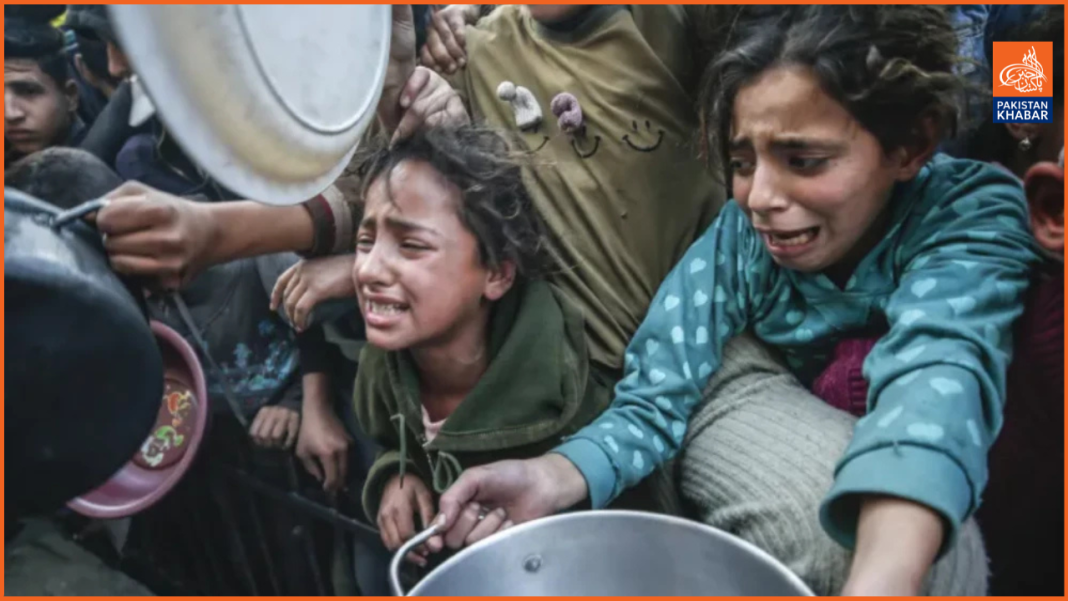As Israel’s siege enters its eighth week, the United Nations’ food organization has reported that all of its food supplies in the Gaza Strip have run out, therefore forcing over 400,000 Palestinians near to famine.
Early this week, the World Food Program (WFP) reported delivering its last food supplies to community kitchens. Within days, those meals should be completely gone.
“The situation inside the Gaza Strip has once again reached a breaking point,” the WFP declared in a Friday statement. “People are running out of ways to cope; the fragile gains made during the short truce have unravelled.”
The company cautioned that it will be compelled to stop all remaining food assistance efforts unless humanitarian access is restored right away.
There has been modest stockpiling of commodities during the earlier this year brief truce. But those reserves have run out now. WFP statistics shows that the cost of basic food products has skyrocketed by 1,400 percent, leaving most households with very little remaining.
Already stressed local aid kitchens are now serving barely half the population and only a quarter of their daily calorie requirements.
According to Gaza’s Government Media Office, starvation or malnutrition has already claimed at least 52 lives, half of them youngsters. Daily food shortage affects over a million youngsters living in Gaza.
From Gaza City, Al Jazeera’s Hani Mahmoud said that hunger is increasingly obvious on the streets. People are famished. Already, they are restricting supplies, he remarked. “It’s not only the organisations; families running out of food also count.”
Originally supporting 25 bakeries in Gaza, the WFP had to close them on March 31 due to shortages of cooking fuel and bread. Earlier that month, also completely distributed were household food packs meant to last two weeks for households.
Since Israel closed all border crossings two months ago, no aid—commercial or humanitarian—has arrived Gaza. WFP and allies now stockpile around 116,000 metric tons of food, ready for Gaza once access is allowed.
Though the group disputes any diversion of food, Israeli officials have defended the blockade as essential to stop Hamas from acquiring access to assistance supplies. Israeli Defence Minister Yoav Gallant claimed last week that the closure was meant to “pressure” Hamas into a compromise.
International censure of the approach is growing. Germany, France, and the United Kingdom released a unified statement on Wednesday that the embargo is “intolerable” and warned of widespread hunger and disease outbreaks.
The UN human rights office claimed that the embargo, shelling, and destruction of vital infrastructure taken together might constitute collective punishment of Gaza’s 2.2 million people.
Further compromising humanitarian efforts, it claimed the Israeli force had specifically targeted key civilian infrastructure like water pipelines, sewer systems, ambulances and machinery required in rescue operations.
UN authorities claimed that Israeli air attacks on 21 and 22 April destroyed 36 relief vehicles and machines used for water distribution, sewage management and rubbish removal throughout three governorates in Gaza.
Attacks on shelters and residences have likewise becoming more frequent. There were 91 recorded strikes on tent camps for displaced people and 229 on residential buildings between mid-March and late April.
Violence keeps blazing in the West Bank in parallel. UN officials document growing settler attacks and Israeli military actions, including a major campaign in Jenin and Tulkarm refugee camps now running their third month. Under international law, rights organizations claim these might be considered forcible transfer.
Efforts at a truce in Gaza still stand frozen. This weekend in Cairo, a delegation from Hamas is coming for negotiations arranged by Egypt. The group objects to a ceasefire excluding a complete Israeli withdrawal and a permanent halt to hostilities. Israel has hitherto only provided brief pauses in return for freeing of hostages.
Palestinian officials claim that over 51,439 Palestinians have been killed and 117,416 injured in Gaza since October 7, 2023. Israeli bombings since the most recent truce fell apart on March 18 have claimed around 1,900 lives.
Now that starvation looms large, the WFP demanded quick access and said food aid was ready should passways be opened.
“WFP advises all parties to give civilian needs top priority and let relief into Gaza right away so they may fulfill their obligations under international humanitarian law,” the agency stated.



